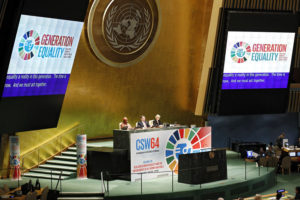Global Human Rights: Strengthening UN Support to Save Lives
 September 2024 is the month when world leaders and diplomats from around the world gather in New York City, New York, to discuss a variety of global issues ranging from conflict to poverty to education, among many others. From September 22-30, the whole world will be watching as world leaders address international challenges, such as eliminating nuclear weapons and antimicrobial resistance, in summits and high-level meetings in an effort to fulfill the Sustainable Development Goals (SDGs).
September 2024 is the month when world leaders and diplomats from around the world gather in New York City, New York, to discuss a variety of global issues ranging from conflict to poverty to education, among many others. From September 22-30, the whole world will be watching as world leaders address international challenges, such as eliminating nuclear weapons and antimicrobial resistance, in summits and high-level meetings in an effort to fulfill the Sustainable Development Goals (SDGs).
Overall, the theme of the 79th session of the U.N. General Assembly is “Leaving no one behind: acting together for the advancement of peace, sustainable development and human dignity for present and future generations.” Despite the positive aspiration in the theme, reports from U.N. agencies within the last year show that there has not been stronger U.N. support recently.
Institutional Issues Within the UN System
The U.N. system is facing internal institutional challenges, resulting mainly from funding shortages and inadequate support for its efforts to help vulnerable communities in places such as Gaza and Mali. In fact, on August 30, 2024, the acting Under-Secretary-General for Humanitarian Affairs and Emergency Relief Coordinator stated that as the number of humanitarian emergencies increases, a shortage of funding hinders them from “reaching people who need life-saving assistance.”
Although agencies such as the World Food Programme (WFP) and the U.N. Refugee Agency (UNHCR) have been implementing innovative solutions to difficult issues, countries are not providing the stronger U.N. support needed to make these solutions work on a larger scale. This highlights a lack of commitment from the international community to protect and preserve global human rights values.
More Funding Equals More Lives Saved
The main obstacle to the U.N.’s humanitarian work is the lack of adequate funding for its critical life-saving operations. The Office for the Coordination of Humanitarian Affairs (OCHA) at the U.N. has stated that of the $49 billion needed to reach at least 187 million people who need assistance the most, it only received 29% of the funds.
As of August 30, 2024, the countries whose emergency operations are deemed underfunded include Chad, the Democratic Republic of the Congo, Honduras, Lebanon, Niger, Sudan and Syria. Although OCHA was able to assist these countries via its emergency response funds, stronger financial support is still needed to ensure that OCHA can reach as many vulnerable communities as possible around the world.
Funding Innovation in Humanitarian Aid
As humanitarian aid becomes more difficult and complex, U.N. agencies have decided to find new ways to overcome obstacles and deliver more life-saving assistance than before, including digital data-sharing between agencies. For example, UNHCR has a database on digital registration, identity management and case management called PRIMES. In contrast, WFP has one on digital beneficiary information and transfer management called SCOPE.
Thus, in an effort to enhance their aid operations, UNHCR and WFP created a joint database combining both PRIMES and SCOPE called PING that helps both agencies transfer data safely and efficiently. Therefore, if the international community provides stronger U.N. support via more funds, it will enable U.N. agencies to innovate their life-saving operations further.
Strengthening Global Human Rights
The needs and innovations of U.N. agencies highlight the urgent need for stronger support from countries worldwide. With the rise in global conflicts and crises, the number of vulnerable people requiring life-saving aid has grown, outpacing the U.N.’s current funding capabilities. Although U.N. agencies have been implementing the necessary reforms that enhanced their life-saving operations, such as inter-agency digital data sharing, more monetary support is needed for them to implement more innovative reforms.
– Abdullah Dowaihy
Abdullah is based in Riyadh, Saudi Arabia and focuses on Technology and Politics for The Borgen Project.
Photo: Flickr
